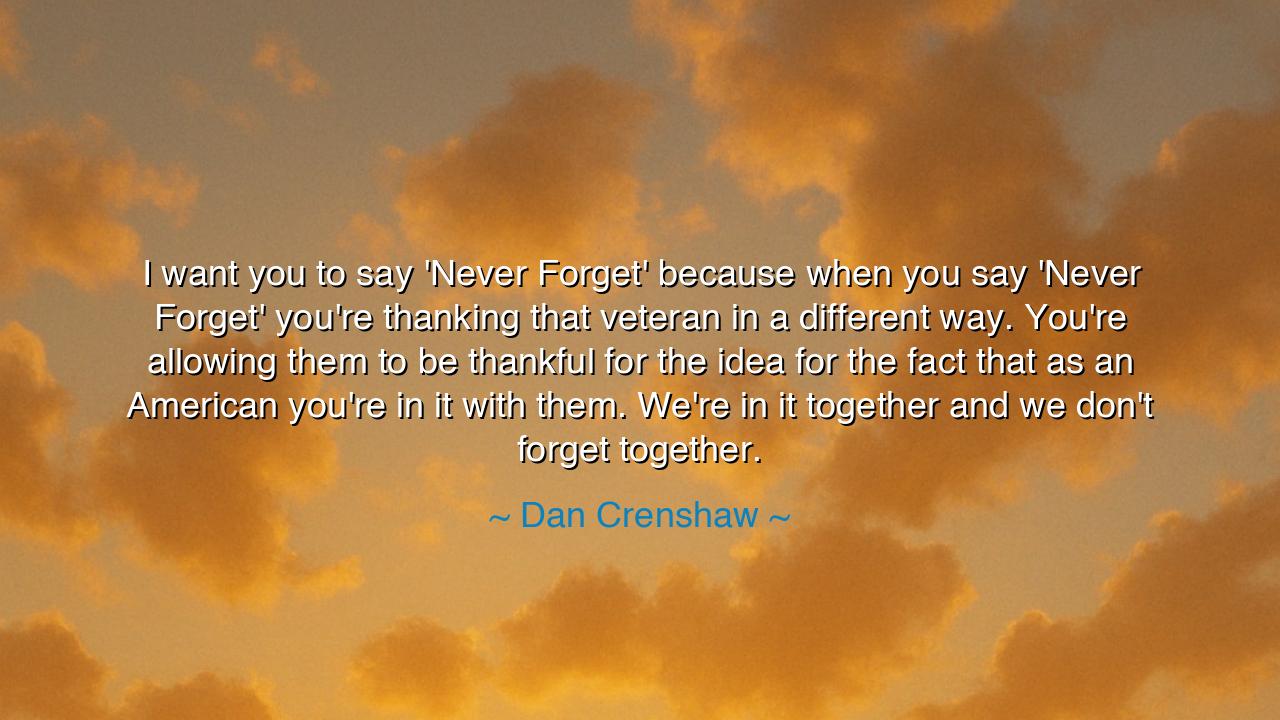
I want you to say 'Never Forget' because when you say 'Never
I want you to say 'Never Forget' because when you say 'Never Forget' you're thanking that veteran in a different way. You're allowing them to be thankful for the idea for the fact that as an American you're in it with them. We're in it together and we don't forget together.






Hear the words of Dan Crenshaw: “I want you to say ‘Never Forget’ because when you say ‘Never Forget’ you’re thanking that veteran in a different way. You’re allowing them to be thankful for the idea for the fact that as an American you’re in it with them. We’re in it together and we don’t forget together.” These words rise with solemn power, for they speak not only of gratitude but of unity. They remind us that memory is not a solitary act but a bond, and that remembrance itself is a form of thanksgiving. To say “Never Forget” is to shoulder part of the burden of sacrifice, to honor not just the individual veteran but the shared struggle of a people.
The origin of this reflection comes from the battlefield and its aftermath. Dan Crenshaw, a Navy SEAL who lost his right eye in combat, knows the cost of service not as an idea but as lived reality. For him, gratitude cannot be shallow words of thanks spoken from a distance; it must be tied to remembrance, to the continual honoring of sacrifice. In this way, saying “Never Forget” becomes an act of solidarity—an acknowledgment that the scars of veterans are not theirs alone but belong to the nation they defended.
History bears witness to the sacred power of remembrance. Consider the words “Lest we forget,” spoken in the aftermath of the world wars. In towns across Europe, monuments were raised not simply as stone but as voices calling out across generations: remember the fallen, honor their sacrifice, and live in a way that their deaths are not in vain. In this way, remembrance itself became a covenant between the living and the dead. Crenshaw’s call echoes this ancient tradition: remembrance is gratitude, and gratitude is unity.
There is in his words a deep lesson about the nature of true thankfulness. Gratitude that ends with words alone can be fleeting, even hollow. But gratitude tied to memory, gratitude that refuses to let sacrifice fade into the mists of time, becomes enduring and powerful. Veterans, he says, are not only honored when we thank them—they are honored when we stand beside them in remembrance, saying together, “We have not forgotten. We carry this with you.” This is the higher form of thanksgiving.
His statement also emphasizes unity: “We’re in it together and we don’t forget together.” Sacrifice is never borne by the soldier alone; it is carried by families, by communities, by nations. To remember as a people is to declare that veterans are not abandoned to their wounds, nor left to bear memory in isolation. Instead, remembrance becomes a collective act, a chorus of voices refusing silence. And in that togetherness, both veterans and civilians find strength.
The lesson, then, is this: remembrance is responsibility. To say “Never Forget” is not a ritual of empty words; it is a pledge to live mindful of sacrifice, to cherish freedom, and to honor those who gave much for it. It is to recognize that the struggles of others purchased the peace we enjoy, and that such peace is maintained only through vigilance, gratitude, and unity.
Practical actions arise from this teaching. Do not let days of remembrance pass as mere holidays; speak aloud the words “Never Forget” and mean them. Visit the monuments, tell the stories to your children, and carry forward the legacy of those who served. When you meet a veteran, thank them not only with words but with remembrance—by living as one who has not forgotten the price of freedom. And above all, strive to live as a people united, for division dishonors sacrifice, but unity sanctifies it.
Thus, let the words of Dan Crenshaw endure: “Never Forget” is not only a phrase, but a covenant of gratitude and solidarity. It binds a people to their veterans, the living to the fallen, and the present to the past. To remember is to give thanks, and to give thanks is to remain one people, carrying together the burdens of sacrifice and the blessings of freedom.






AAdministratorAdministrator
Welcome, honored guests. Please leave a comment, we will respond soon